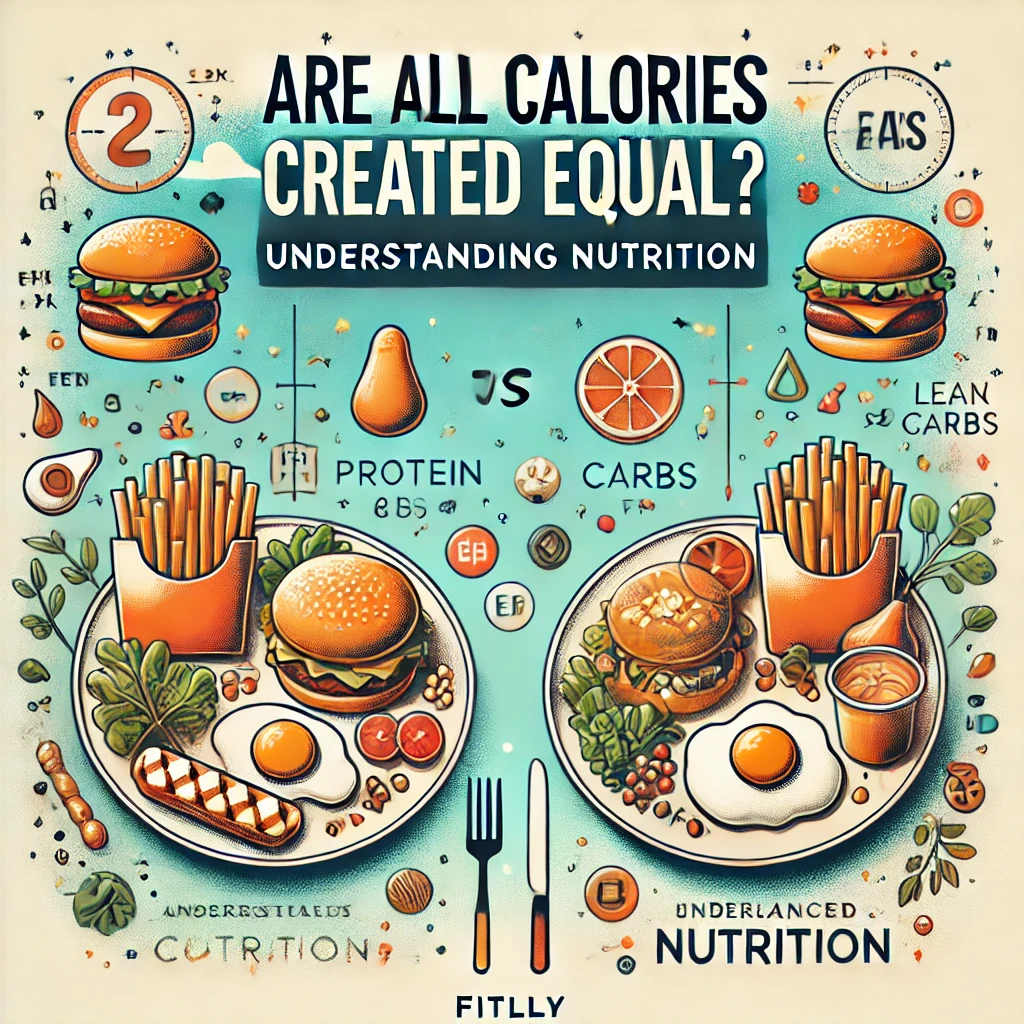
Introduction
Ever wondered if eating 100 calories of candy is the same as eating 100 calories of vegetables?
While the number of calories may be identical, the effects on your body can be drastically different. When it comes to weight loss, energy balance is essential, but not all calories are created equal. Let’s explore why the quality of your calories matters and how it can impact your health and fitness goals.
Section 1 :
What Are Calories and Why Do They Matter ?
A calorie is a unit of energy that measures how much energy food provides to the body. When we consume food, our bodies convert these calories into energy for daily activities, bodily functions, and exercise. While calories are a fundamental part of the energy balance equation calories in versus calories out—they don’t tell the whole story.
The source of your calories plays a critical role in how your body processes them, affecting metabolism, hunger, energy levels, and even fat storage. Simply focusing on the number of calories consumed without considering the quality can lead to poor health outcomes, even if you’re maintaining a caloric deficit for weight loss.
Section 2 :
Why the Source of Your Calories Matters
1. Nutrient Density vs. Empty Calories
- Nutrient-dense foods provide a high amount of vitamins, minerals, fiber, and other essential nutrients for relatively few calories. Examples include vegetables, fruits, lean proteins, and whole grains.
- Empty-calorie foods are high in calories but low in nutritional value, such as sugary drinks, fast food, and processed snacks. While they can provide energy, they offer little to no nutritional benefit and can contribute to weight gain and other health problems.
2. How Different Macronutrients Affect the Body
- Protein: Caloric intake from protein has a higher thermic effect, meaning the body uses more energy to digest it compared to carbs or fats. Protein also promotes satiety and helps maintain muscle mass during weight loss.
- Carbohydrates: Not all carbs are the same. Refined carbs, like white bread and sugary snacks, can spike blood sugar levels, leading to energy crashes and increased hunger. In contrast, complex carbs, such as oats and brown rice, provide sustained energy and support digestive health.
- Fats: Healthy fats, such as those from avocados, nuts, and olive oil, support hormone regulation and provide long-lasting energy. Trans fats and excessive saturated fats, on the other hand, can raise cholesterol levels and increase the risk of heart disease.
3. The Impact on Blood Sugar and Insulin Response
- The type of food you consume influences blood sugar levels. For instance, eating simple sugars causes a rapid spike in blood glucose, followed by a drop, often leaving you feeling hungry soon after.
- Foods high in fiber, protein, and healthy fats tend to have a more stable effect on blood sugar, helping control cravings and supporting weight management.
Section 3 :
Practical Tips for Choosing Quality Calories
1. Prioritize Whole, Unprocessed Foods
- Focus on eating foods that are as close to their natural state as possible. Whole foods provide more nutrients and fewer added sugars and unhealthy fats.
- Incorporate a variety of colorful fruits and vegetables, lean proteins, whole grains, and healthy fats into your diet.
2. Read Nutrition Labels Carefully
- Pay attention to serving sizes and ingredients. Just because a product is marketed as “low-fat” or “sugar-free” doesn’t necessarily mean it’s healthy.
- Look for foods with higher amounts of fiber, protein, and healthy fats while avoiding those high in added sugars and refined grains.
3. Balance Your Macronutrients
- Ensure your meals include a mix of protein, complex carbs, and healthy fats to keep you full and energized throughout the day.
- Adjust macronutrient ratios based on your activity level and fitness goals. For
instance, athletes may need more carbs for energy, while those aiming for weight loss might benefit from a higher protein intake.
Section 4 :
Expert Insights on Calorie Quality
Research published in the New England Journal of Medicine indicates that people who consumed higher-quality calorie foods rich in nutrients and low in refined sugar had better health outcomes and more sustainable weight loss than those who focused solely on calorie counting.
Additionally, the American Journal of Clinical Nutrition found that individuals who ate more whole foods experienced improved metabolic health and reduced risk factors for chronic diseases, even if they didn’t significantly change their total caloric intake.
Conclusion
While calories play a crucial role in weight management, not all calories are created equal. The quality of the calories you consume can influence your overall health, energy levels, and ability to achieve your fitness goals. Focusing on nutrient-dense foods and balancing your macronutrients can help you get the most out of your diet.
Want to learn more about optimizing your diet for better results? Download our free nutrition guide or schedule a consultation for personalized meal planning. Let’s work together to fuel your body the right way!
